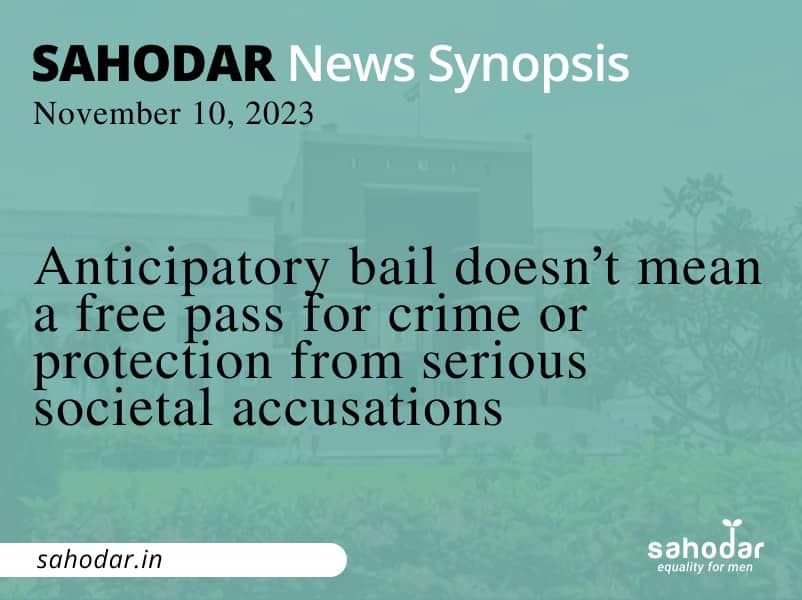Introduction:
Anticipatory bail, a legal provision enshrined in Section 438 of the Code of Criminal Procedure, is a crucial aspect of criminal jurisprudence aimed at shielding individuals from unwarranted harassment and arrest. Recent judicial pronouncements, particularly those emanating from the Gujarat High Court, have provided nuanced insights into the intricate interplay between anticipatory bail and the societal and investigative imperatives inherent in criminal cases. This comprehensive analysis seeks to delve into the legal dynamics of anticipatory bail, elucidating its underlying principles and implications, with a particular focus on the recent rulings of the Gujarat High Court.
Understanding Anticipatory Bail:
Anticipatory bail is a legal remedy designed to prevent the arbitrary arrest or detention of an individual based on allegations of committing an offense. The primary objective is to protect individuals from the potential abuse of the legal process, ensuring that they are not subjected to unwarranted harassment or humiliation. The anticipatory bail provision is not, however, a license for the commission of offenses nor a shield against serious societal accusations.
Recent Gujarat High Court Pronouncements:
The recent rulings of the Gujarat High Court, particularly those arising from an application under Section 438, have provided significant clarity on the scope and purpose of anticipatory bail. Justice Hasmukh D. Suthar, presiding as a Single Bench, articulated the court’s stance on anticipatory bail in the context of charges under diverse sections of the Indian Penal Code.
The court emphasized that anticipatory bail should be perceived as a protective measure, shielding individuals from unwarranted persecution. Justice Suthar cautioned against misconstruing anticipatory bail as a tool for facilitating the commission of offenses or as an impervious shield against serious societal accusations. The nuanced judicial interpretation offered by the Gujarat High Court establishes a jurisprudential framework that balances individual rights with societal interests.
Legal Analysis of Recent Cases:
One of the cases considered by the Gujarat High Court involved an individual facing charges related to forgery in the context of a competitive examination for a Clerk position. The court acknowledged the gravity of the alleged misconduct within the realm of competitive examinations, underscoring the importance of preserving the integrity of such evaluative processes.
The court’s analysis also delved into the temporal aspect of anticipatory bail. It raised pertinent concerns about the potential hindrance posed by early bail grants to the investigatory process. The court asserted that custodial interrogation, often necessary to ascertain the involvement of other individuals and ensure a qualitative investigation, could be impeded by the premature conferment of anticipatory bail.
Balancing Individual Liberties and Societal Interests:
A recurring theme in the recent Gujarat High Court pronouncements is the delicate balance that must be struck between safeguarding individual liberties and upholding societal interests, especially in cases where serious offenses are disclosed. The court exhibited circumspection in granting pre-arrest bail, emphasizing the societal impact of certain offenses. This balance is crucial to ensuring justice while respecting the fundamental rights enshrined in the Constitution.
The court’s scrutiny of the prima facie evidence against the accused, coupled with a consideration of societal interests, reflects a nuanced approach to the grant of anticipatory bail. The court asserted that arrest, rather than being punitive, is an integral facet of the investigative process. It facilitates the collection of crucial information, ensuring the elucidation of material facts and the preservation of the larger societal interest.
Legal Precedents and Jurisprudential Framework:
The recent Gujarat High Court rulings contribute to the evolving jurisprudential framework surrounding anticipatory bail. Legal precedents play a pivotal role in shaping the interpretation and application of legal provisions. In this context, the court’s elucidation on the protective nature of anticipatory bail aligns with the broader purpose of criminal law – to ensure justice while protecting individuals from undue persecution.
The jurisprudential framework surrounding anticipatory bail is not static; it evolves to address the complexities and nuances of contemporary legal challenges. The recent rulings of the Gujarat High Court add layers of interpretation to this framework, providing guidance to legal practitioners, scholars, and the judiciary on the nuanced application of anticipatory bail provisions.
Implications for Criminal Jurisprudence:
The implications of the recent Gujarat High Court rulings extend beyond the specific cases considered. They have broader implications for criminal jurisprudence, especially concerning the delicate balance between individual rights and societal interests. The court’s emphasis on the societal impact of certain offenses reinforces the notion that the criminal justice system serves not only to punish the accused but also to protect the larger social fabric.
The court’s scrutiny of the timing of anticipatory bail in the investigatory timeline underscores the need for a nuanced approach. While anticipatory bail serves as a safeguard against unwarranted harassment, it must not hinder the investigative process. The court’s recognition of the investigatory imperatives, including custodial interrogation, highlights the pragmatic considerations that underlie the grant of anticipatory bail.
Conclusion:
In conclusion, the recent Gujarat High Court rulings on anticipatory bail provide a comprehensive legal analysis that goes beyond the specific cases considered. They reaffirm the protective nature of anticipatory bail while cautioning against its misuse as a tool for facilitating offenses. The delicate balance between individual rights and societal interests is a recurring theme, emphasizing the court’s commitment to justice and the preservation of the larger societal order.
As the legal landscape evolves, so does the interpretation and application of legal provisions. The recent rulings contribute to the jurisprudential discourse surrounding anticipatory bail, providing clarity and guidance to legal practitioners and the judiciary. They underscore the dynamic nature of the law and its continual adaptation to address the complexities of contemporary legal challenges. The analysis of anticipatory bail offered by the Gujarat High Court serves as a valuable contribution to the broader dialogue on the intersection of individual rights, societal interests, and the imperatives of criminal justice.

